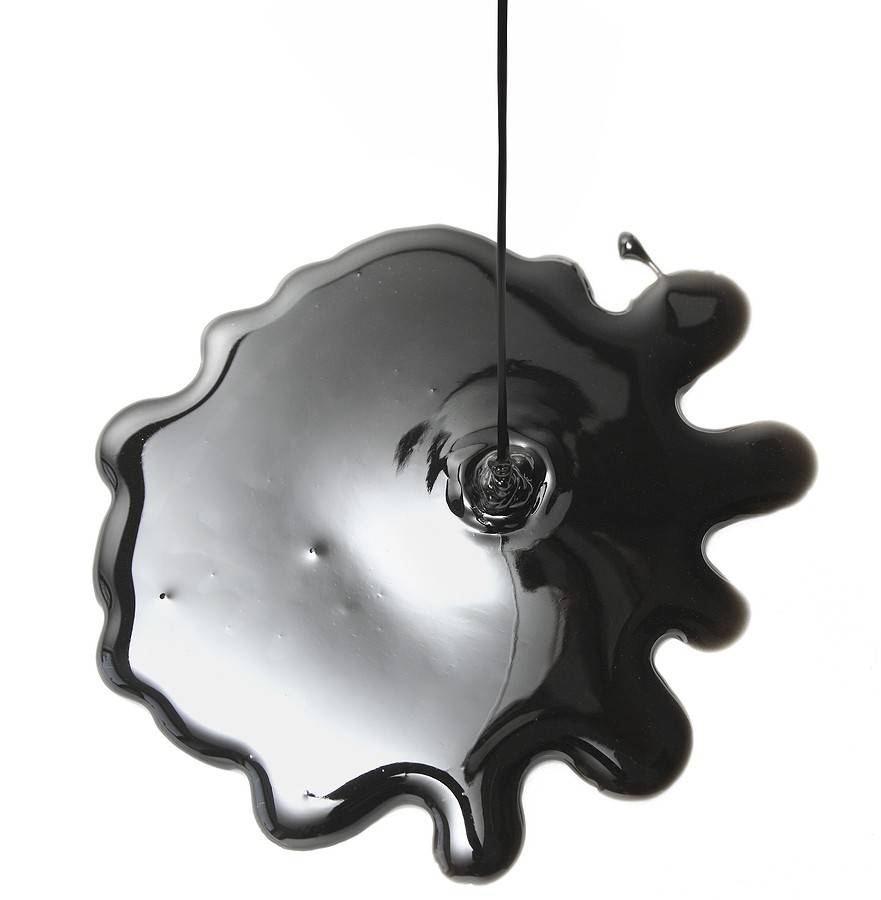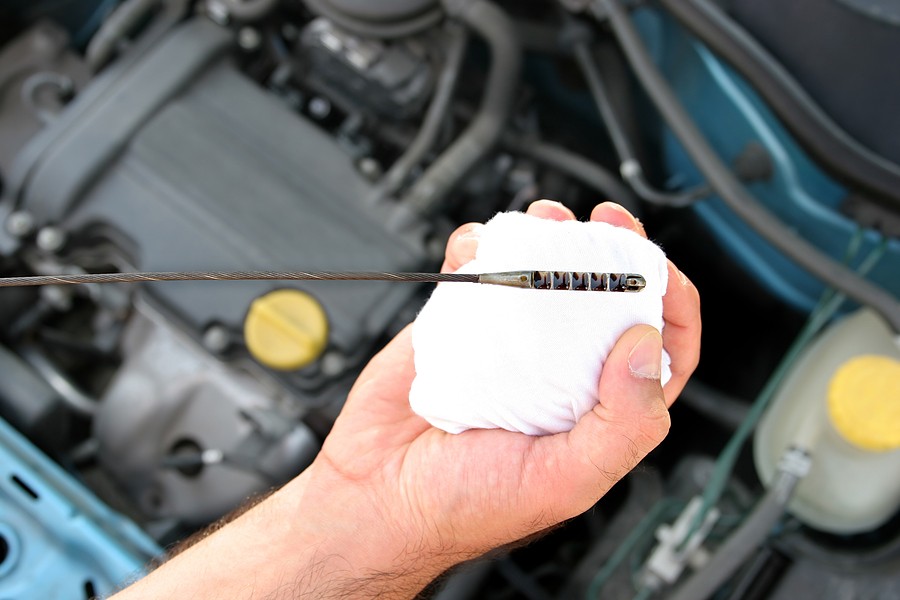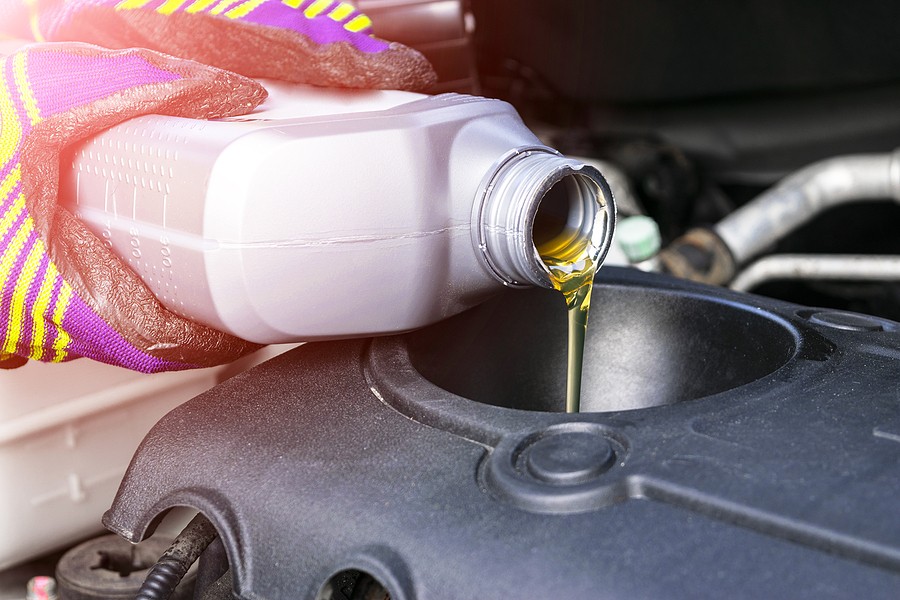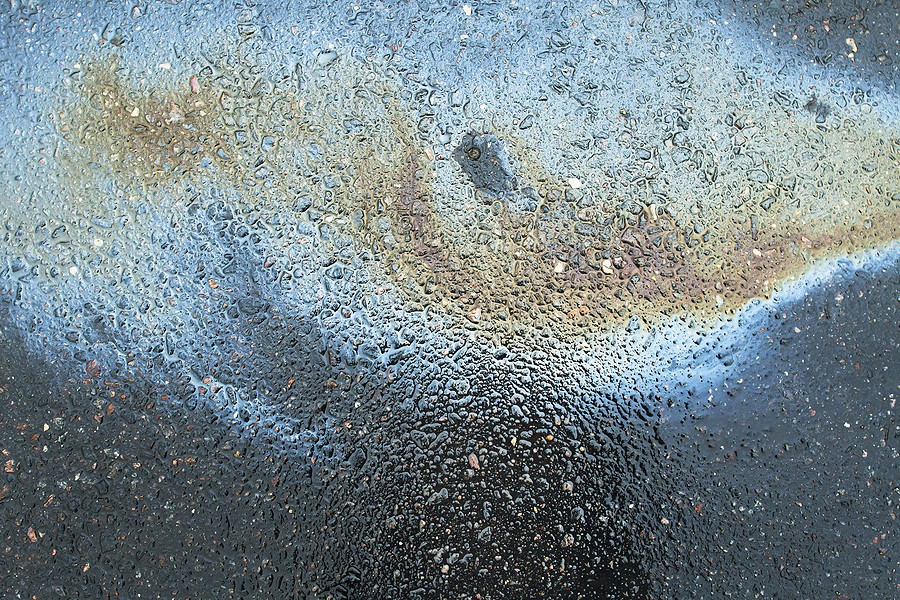If you're searching for “how to know if engine oil is leaking,” below are the 15 common signs:
- Fluid puddles
- Burning oil smells
- Low oil level
- Oil pressure warning light
- Visible oil on the engine components
- Oil on the ground after a vehicle is parked
- Smoke from the engine Bay
- Vehicle sputtering
- Weird engine noises
- Oil in the coolant
- Smokey exhaust
- Reduce fuel efficiency
- Engine overheating
- Leak stains
- Oil in the air filter housing
Your vehicle contains several fluids; each is responsible for a specific job. As a car owner, you're responsible for maintaining the quantity and quality of these fluids to avoid dealing with devastating problems.
Engine oil is one of the most critical fluids you must keep up with to avoid costly repairs that might result in replacing a new engine.
Over time of use, you might experience situations where your motor oil might start leaking because of internal or external problems. Regardless of the problem source, it would be best to address it immediately to avoid engine self-destruction.
This article highlights the 15 most common symptoms that could help you answer the question, “How to you know if engine oil leaks?” Whenever you experience these symptoms, you must consult your mechanic and have him address the oil leak immediately.
How do we know if engine oil is leaking?
When your engine oil leaks, it can be a very serious situation that might damage the engine. Therefore, you must understand the most common symptoms that could help you identify potential oil leaks as soon as possible so you can address them before installing major components.
The following list summarizes the 15 most common symptoms that might indicate an oil leak. Remember that some of these symptoms might be very general, so you must thoroughly inspect whether the problem is linked to an oil leak or something else.
1- Fluid puddles
The most straightforward method to identify whether your engine leaks oil is by performing the invisible inspection. If you realize there are fluid puddles underneath the engine compartment, it is most likely an oil leak.
However, you must inspect the fluid carefully to confirm it's oil, not something else. For example, it might be a transmission fluid or water leaking from the AC. Regardless of what fluid is leaking, you must address it so you don't deal with further complications unless what's leaking is just water from the AC.
2- Burning oil smells
Leaking oil within the engine compartment can lead to burning smells. This is because the motor oil can be very hot, and as it lands on rubber components, it mixes either a rubber-burning smell or an oil-burning smell.
As a rule of thumb, automotive experts always recommend that you never ignore any weird smells from your car. It is just a way for your car to bring your attention to internal problems that might be very serious.
3- Low oil level
Another common symptom of an oil leak is a reduction in oil level. This can be very serious because it seems like the oil has been leaking for a long time to the point where it impacted the oil level clearly and reduced the oil level and pressure.
Therefore, you should adjust the problem before it gets to this point because, in most scenarios, if it gets to this point where your engine is complaining about a low oil level, then you might not be able to drive your car at all.

4- Oil pressure warning light
Typically, the oil system must operate within a certain pressure level; if there is any oil leak, your oil pressure level will be impacted, which will be translated as a pressure warning light on the dashboard.
It's always a good idea to never ignore any warning lights on the dashboard regardless of where they're coming from because theirs are just ways to communicate with you and help bring your attention to internal car problems.
5- Visible oil on the engine components
If you visually inspect the engine compartment, you might notice some potential spots of oil leaking on the hot components. The leaked oil might sometimes evaporate immediately because it drops on hot components but might go to the ground.
If you notice any of these dried spots on the engine compartment, you shouldn't ignore it and say it's not a severe problem because the more you eat on the problem, the more it evolves and requires significant repairs.
6- Oil on the ground after a vehicle is parked
If the oil leak is very significant, then you'll see oil dripping on the floor, and every time you park your car, you'll see a puddle of oil on the ground after the vehicle is parked.
The oil puddle will be more visible than any other fluid level reductions and other fluid leaks because it is thick and likely has an oil burn smell. You can check with one of your family members or friends to help confirm whether it's oil or something else driving underneath the car.

7- Smoke from the engine Bay
As the oil gets hotter and keeps dripping on the engine compartments, it might start burning and causing some smoke out of the engine Bay. Therefore, dealing with such situations can be critical and serious, especially if you start seeing smoke clouds from the hood.
8- Vehicle Sputtering
If your vehicle starts hesitating or sputtering every time you try to hit the gas pedal, it could be a problem linked to any other issue, but it might be an issue with an oil leak. Therefore, you must monitor the vehicle carefully and see if it's a continuous problem or something happens occasionally.
9- Weird engine noises
Another potential symptom of an engine oil leak is when you experience engine noises. Typically, your engine will start complaining, and you'll most likely start hearing some grinding noises because the internal metal components within the engine are not fully lubricated. You can also start noticing some ticking or knocking noises as things evolve.

10- Oil in the coolant
Another potential rare symptom you might experience when leaks are oil in the coolant. Oil is not supposed to get mixed with coolant; if there's any internal crack or sealed breakage, this could happen and be a serious issue.
Each coolant and oil fluid is responsible for different jobs and should not get mixed. When mixed, they lose their characteristics, and none can perform the right job; therefore, your engine might overheat.
11- Smokey exhaust
One common result of oil mixing with coolant or making its way to the engine cylinders is Smokey exhaust. In most scenarios, your exhaust should not have a visible smoke color because this might indicate something wrong with the vehicle.
If you realize that your car is continuously making some strong white smoke or potentially blue smoke, it might indicate that some of the fluids made their way to the engine cylinders, which can be a serious problem.
12- Reduce fuel efficiency
If the engine does not receive the right lubrication, it'll be stressed out, and as it gets more stressed, it'll start consuming more fuel, thinking it will produce more energy. However, that will only result in reducing the vehicle's fuel efficiency.

13- Engine overheating
Engine overheating is a very common issue you'll experience when there is a lot of oil leak. Therefore, you must monitor the temperature gauge on the dashboard and see if it's related to oil level reduction to know whether it's an oil leak or something else.
14- Leak stains
As we indicated before, the oil leak might be internal and external. Therefore, if you start noticing some leak stains on the different components within the engine compartment, it might indicate that your oil is leaking internally.
15- Oil in the air filter housing
Finally, an oil leak can access many components, including the air filter housing. This situation is not good because it impacts the engine and your vehicle's overall performance. Therefore, you should address this oil leak immediately to avoid dealing with additional problems.

How do we know if engine oil is leaking? Final Thoughts
The engine oil leak is never a fun situation. It can be a serious problem that might damage the entire engine. As a co-owner, it is important for you to understand what symptoms look for when you suspect that your engine is leaking oil.
This article highlighted 15 common symptoms to help you answer the question, “How do you know if engine oil leaks?” Whenever you experience these symptoms, you must address the oil leak as soon as possible and avoid driving your car unless you get clear recommendations from your mechanic.
If you're interested in similar posts, we highly encourage you to visit our blog by clicking here.



